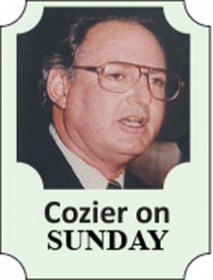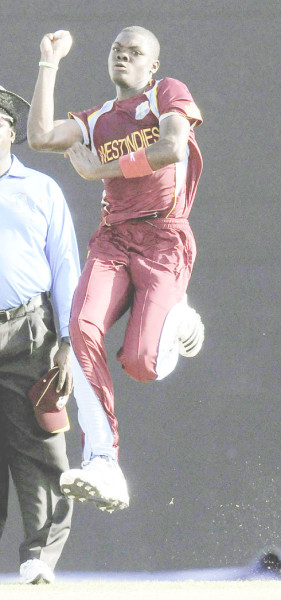 CONCERNED that prevalence of spin was ‘impacting negatively’ on pace, the West Indies Cricket Board (WICB) directed its cricket committee last June “to make further recommendations to prioritize the development of fast bowlers in the region and for the West Indies team.”
CONCERNED that prevalence of spin was ‘impacting negatively’ on pace, the West Indies Cricket Board (WICB) directed its cricket committee last June “to make further recommendations to prioritize the development of fast bowlers in the region and for the West Indies team.”
Whether or not purely coincidental, Alzarri Joseph, a powerfully built, 6 foot, 4 inches of genuine pace, has suddenly emerged to unsettle batsmen and ease the WICB’s anxiety. The reasonable expectation is that his influence on the West Indies’ triumph in the recent under-19 World Cup, beamed live on television throughout the Caribbean, inspires a revival of fast bowling, always the hallmark of the finest West Indies teams.
Joseph was clocked as delivering the fastest ball in the tournament, 147 kph/91.5 mph. He consistently hovered around the high 80s-90 mph. He claimed at least one wicket in each of his opening bursts.
Helmets were hit, gloves were jammed against bat handles. Of his 13 wickets, four were bowled, with stumps ripped out of the ground, three were lbw and three caught by wicket-keeper Tevin Imlach off tentative edges or miscued hooks. Another was stumped, not a notation to please any fast bowler, as the alert Imlach pinged the stumps with India’s careless opener Rajendra Pant still out of his ground after letting the fourth ball he faced in the final go through.

Joseph carried similar feats for the Leeward Islands Hurricanes in the first-class Professional Cricket League (PCL) into the World Cup. On a helpful pitch at Windsor Park in Dominica, his return was seven for 46 against the Windward Islands last November.
The questions now arise as to whether his record merits his immediate elevation into the West Indies senior team for its next international engagements, the three-way ODI series with Australia and South Africa in the Caribbean in June to be followed by four Tests against India, or whether the selectors would waver over his inexperience.
Creating problems for teenaged batsmen is an entirely different proposition than confronting David Warner, AB deVilliers and Virat Kohli and their cronies in the intense competition at the highest level.
Stacked alongside the struggles of the two bowlers in the current team once regularly capable of 140 kph pace and above and with no other genuine contenders, Joseph’s pace is enough to secure his ticket through.
On the recent tour of Australia, Jerome Taylor and Kemar Roach, the only active West Indians with over 100 Test wickets, made negligible impressions. Taylor’s two wickets in four innings cost him 128.5 runs each; Roach, his clocking markedly down from his previous top speeds, took none. On his return to the Barbados team in the first-class PCL, Roach broke down in his fourth over and did not return.
Joseph’s present position equates to that of Kagiso Rabada’s in the 2014 under-19 World Cup. Fast and hostile, he was the key to South Africa’s championship, just as Joseph was to the West Indies in Bangladesh.
Their selectors wasted no time including him in the ODI and Test teams. On his ODI debut, he scattered Bangladesh with figures of six for 16; now 20, he already has 24 wickets in six Tests (average 24.7) and 30 in 14 ODIs (20.13). Cricket’s sky is his limit.
Wes Hall, one of the famous West Indies tearaways of an earlier generation, is in no doubt that the same route should be open to Joseph.
“Fast bowling is one area you can take the chance of selecting raw talent,” he says.
He was 19 and had converted from wicket-keeper at Combermere School in Barbados to fast bowler in the space of a year when chosen for the West Indies 1957 tour of England purely on his potential, pace and powerful physique. He didn’t make the Test team, ending with 27 first-class wickets; it was a valuable experience.
“I really didn’t know much about bowling, didn’t even know how to hold the ball, but I took my time to learn,” he explains. When the West Indies next toured, for five Tests in India and three in Pakistan in 1958-59, Hall was a last-minute replacement for Frank Worrell. His 46 wickets in the seven Tests, including a hat-trick against Pakistan, the first by a West Indian, heralded the start of a 10-year career that ended with 192 wickets and a reputation as one of the game’s fastest bowlers.
“I believe Joseph is much more advanced at 19 than I was,” he says. “I first saw him in a feature on the Sportsmax television channel about two years ago bowling in the nets. I sat up and took notice right away. It was much the same in the World Cup. He has a strong action that helps his pace and his control. I’d be disappointed if he doesn’t go on to lead the West Indies attack for the next decade or so.”
Joel Garner would go even further than Hall with the promotion of young players. “If I had to take a chance, I would thrust two or three of you in at the deep end now. That’s me,” he told the under-19 World Cup champions at a welcome function on their return home. Now president of the Barbados Cricket Association (BCA) and a WICB director, he said the team had “brought back energy and excitement to watching West Indies cricket again, even though it was at junior level.”
He himself had been “thrust into the deep end” in the 1977 home series against Pakistan, aged 24 after just five first-class matches. He ended with 25 wickets on his way to an eventual 259.
Wayne Daniel was the last West Indian pacer to move quickly from the under-19 team (to England in 1974), aged 18, into the Test team two years later against India in the Caribbean and against England in England. The glut of fast bowlers at the time limited him to 10 Tests; instead he became a feared opponent with Middlesex in the English county championship.
Hall used the cases of Wasim Akram and Fidel Edwards to illustrate his point that it is worth taking the chance with raw talent. Wasim and Edwards were first spotted by the respective Test captains, Imran Khan of Pakistan and Brian Lara of the West Indies, filling the job as net bowlers. Recognizing their pace and their potential, they had them immediately propelled into the Test team. Akram’s vicious left-arm swing earned him 414 wickets over a celebrate career, Edwards’ round-arm, outswing brought him five for 34 against Sri Lanka on debut and 165 wickets overall in 55 Tests, numbers limited by various injuries.
Not all picked at an early age fulfill their promise and those promoting Joseph’s case might be anticipating too much. They won’t know unless the selectors are bold enough to take the chance.









